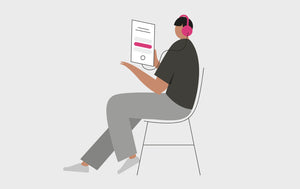Three important things to do if your hearing aid gets wet
If your hearing aids get wet then the main thing to do is to act quickly.
The three most important steps to take are:
- Immediately take the hearing aid away from any water or moisture
- Take out the battery and leave the compartment open
- Dry the hearing aid quickly and completely
Under no conditions use a hairdryer or put your hearing aid in a microwave or an oven.
Why is water damage bad?
It’s inevitable that accidents happen. Hearing aids can be dropped into cups of tea, you can be caught out in the rain, you can be gardening and not realise just how hot you’ve become and now they’re all sweaty! You also wouldn’t be the first person to walk into the shower with your hearing aids still in. But don’t despair, as long as you act quickly enough then you should be able to avoid any water damage to your aids.
Modern hearing aids are technological masterpieces. They are generally made of metal and are full of delicate electronic components. Water, or any sort of moisture, is very bad for them. The casing of the hearing aid can rust and if moisture gets inside then the electronics can corrode and stop working as well.
Water damage can occur from many different situations and not just accidental exposure to water from rain or a shower. In a hot environment, sweat can build up both in and around the ear leading to corrosion. Likewise, if the hearing aid has been exposed to a cold environment and then is brought into a warm one - particularly with behind the ear hearing aids, condensation can occur on both the outside and inside of the casing and cause damage.
Any of the above situations are bad, but not irretrievable. Prevention is obviously better than repair and we definitely advise that you should take a storage device with you when you go out. Preferably one that is able to dehumidify the hearing aids as well as store them.
Storage boxes such as:
Are all pocket-sized and will dehumidify hearing aids at the same time.
If you regularly do activities that require you to wear your hearing aids in an environment where they might get damp then we would recommend you look at options where the hearing aid has a water-resistant coating, like the Hearing Direct P 640S. This will, at least, prevent the outside of the casing from being damaged if there is moisture in the atmosphere.
My Hearing Aid got Wet - What do I do?
1. Immediately take the hearing aid away from any water or moisture
In the case of rain, it’s best to take them out and use a storage box as explained above. Wearing a rain hood with behind the ear hearing aids can cause feedback problems where the hood sits too close to the microphone in the casing, making an uncomfortable whistling noise.
Sometimes you get so used to hearing aids that you forget you’re wearing them. If you take them into the shower then it’s best to immediately get out of the shower (careful you don’t slip in your panic) and remove the hearing aids. It is still not advised to wear in the ear hearing aids into the shower as water can still get to the device.
Lighter moisture problems like sweat or condensation are easier to deal with as you can just follow the next two steps without any panic.
2. Take out the battery and leave the compartment open
It is vital to remove the battery from the device, even if you think that only the outside of the hearing aid became wet. It’s rare to find a hearing aid with a completely sealed battery compartment and therefore no matter how careful you are it is highly likely that water will have penetrated inside.
3. Dry the hearing aid inside and out quickly and completely
Even the largest hearing aids are actually quite small and the smallest, invisible hearing aids are very small indeed. It can be very difficult to dry the aid manually. It’s best to mop up as much visible moisture from the outside and the battery compartment as possible with a clean dry cloth.
Then, place the hearing aid in a warm, dry environment to evaporate any remaining moisture. If you don’t have one available then a dehumidifier is an important investment. When you consider the cost of a hearing aid, then a dehumidifier is a cheap way to keep your hearing aids safe.
Under no conditions use a hairdryer or put your hearing aid in a microwave or an oven.
Dehumidifiers are basically sealable containers with a desiccant material which absorbs moisture. You can get the simple drying pot kits such as: Or there are more sophisticated devices available with UV light to sterilise, as well as gentle heat to dry the hearing aids overnight while you sleep, such as:Remember you can always contact our team for advice or take the hearing aid to your specialist as soon as you can to prevent further or irreversible damage.
Further information
- Waterproof Hearing Aids: What you need to know,
- 5 tips for Keeping your Hearing Aid Safe in Cold Weather,
About Hearing Direct
We are one of the world's leading hearing aid specialists. HearingDirect offers a wide range of affordable products, as well as information resources to help improve the quality of life for the hard of hearing. We sell:
- Hearing aids,
- Batteries,
- Accessories such as earplugs,
- and amplified devices such as super loud alarm clocks and amplified phones.
Don't forget to like our Facebook Page
Author: Stuart Canterbury

Stuart joined the hearing aid industry just at the start of the digital revolution in the mid 1990s. He was part of a team that transformed one of the minor manufacturers into a major player in both production and retail of high technology hearing aids. This journey included working on public/private programmes to accelerate the uptake of high technology hearing aids across a wide distribution. This passion for improving the value and access to good quality hearing lead to the foundation of HearingDirect. After almost a decade and hundreds of thousands of customers, we are starting to establish online sales as a practical, cost-effective channel to provide great hearing to all those who need help.


